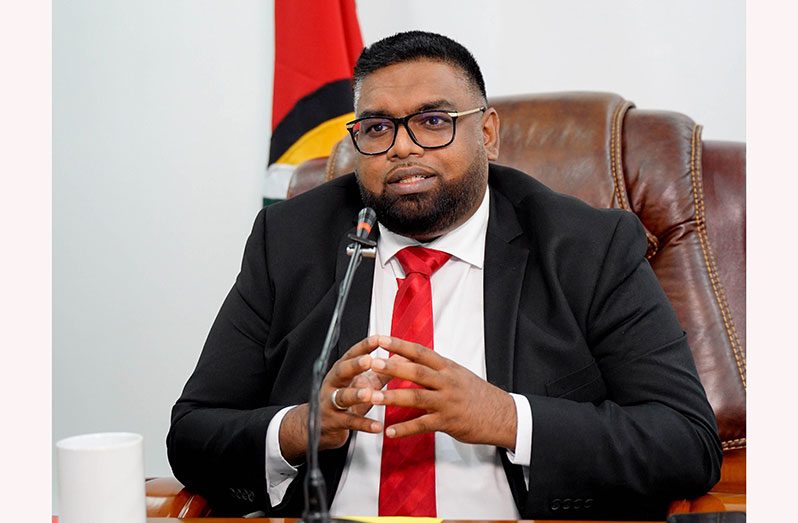-says President Ali
PRESIDENT, Dr. Irfaan Ali’s strong stance against vaccine injustices has not gone unnoticed; as a matter of fact, the Head of State said following his speech at the 76th United Nations’ (UN) General Assembly, many world leaders, along with the UN General Secretary, António Guterres, were appreciative of his decision to address the issue head-on during the high-level gathering.
“Many of the developing countries’ leaders came to me; I raised it with the UN Secretary General in a bilateral meeting and they were all happy that it was raised,” Dr. Ali told reporters on the side lines of an event hosted on Saturday at the Promenade Gardens in Georgetown to observe the 152nd birth anniversary of Mahatma Gandhi.
President Ali said that even though Gandhi’s philosophies have been globally embraced in concept, it is yet to be fully enacted. Evidence of this, he noted, can be found in relation to issues of vaccine injustices that continue to plague the world; a world in crisis.
“We cannot be truly equal, if now our movements can be curtailed based on the vaccine you take…Here in Guyana, we tried to get every single one of the vaccines,” Dr. Ali emphasised.
He went further to reiterate his discontent with countries moving to institute “vaccination for entry” requirements that only accept those vaccines that have been approved by the World Health Organisation (WHO). “The vaccine you take is as a result of necessity,” the President noted.
Dr. Ali in his inaugural address to the UN General Assembly warned that this route could hurt the global efforts to end the polarisation of access to vaccines. “The access to vaccines saw the world polarised,” President Ali told his fellow world leaders, adding, “We must not now hurt our efforts at ending this polarisation of access to vaccines by implementing measures that divide us and curtail our movement based on the type of vaccines our people took.”

Instead, the Head of State said that the world’s efforts should be directed towards addressing vaccine hesitancy, and promoting full vaccination of all eligible citizens of the world.
“Millions took the vaccines which were available at a time of much uncertainty, and they are the unsung heroes. They must not now be the subject of restrictions based on the vaccines they took,” President Ali told the United Nations.
The restrictions being implemented by some are likely to affect thousands of Guyanese who have been immunised using the Russian-made Sputnik V vaccine, which has not been fully approved by WHO, but continues to be administered in over 60 countries, largely owing to impressive real-world results.
Recognising that the peoples of our planet are living under a cloud of uncertainty, President Ali had said that it is important for countries to unite and create conditions that will ease fear, erase doubt, and give hope.
The Guyanese Head of State, in his strongly-worded statement, outlined that even after 76 years since the founding of the United Nations, the world is more driven by “selfish national interests” rather than the collective well-being of “our one planet and our one humanity.”
Dr. Ali reminded that no country can be divorced from the rest of the world, and that all nations are co-dependent. “Those, who at the advent of the pandemic concentrated on making themselves secure, now understand they will not be safe until we are all safe, because the virus knows not – and cares not – about ethnicity, age or geography. It will not heed borders or be stopped by walls,” President Ali told the high-level forum.
He added too that even if the discriminatory vaccine practices continue, “The repercussions will be felt by the rich nations because developing countries are markets for the goods and services of the industrialised nations and the source of their raw materials.”
The President reasoned that “Poor countries cannot buy unless they have the means, and they cannot produce unless they have the capacity.”
US HAS TAKEN NO DECISION
Meanwhile, as it relates to travels to the United States, officials of the Embassy here in Georgetown have said that they are yet to receive instructions as to which COVID-19 vaccines will be accepted by persons travelling to the North American nation.
An article published by online media outlet, News Room, quoted the embassy’s Public Affairs Officer, Violeta Talandis, as saying that “We are looking to [the Centres for Disease Control and Prevention (CDC)] to guide which vaccines will be accepted, as part of their standard role in determining who is considered fully vaccinated for the purposes of recommended or required international travel protocols.”
The United States had said that it will be reopening to fully vaccinated travellers from early November. The reputable Washington Post subsequently released an article which suggested that US would not be accepting persons who are vaccinated with jabs that have not been approved by the WHO or the U.S. Food and Drug Administration (FDA).
In August, the US-manufactured Pfizer vaccine became the first to be fully approved by the FDA.
Nonetheless, even as the United States finalise its travel requirements, President Ali is hopeful that world leaders would come together to eliminate these and other issues relating to vaccine injustice.




.png)









